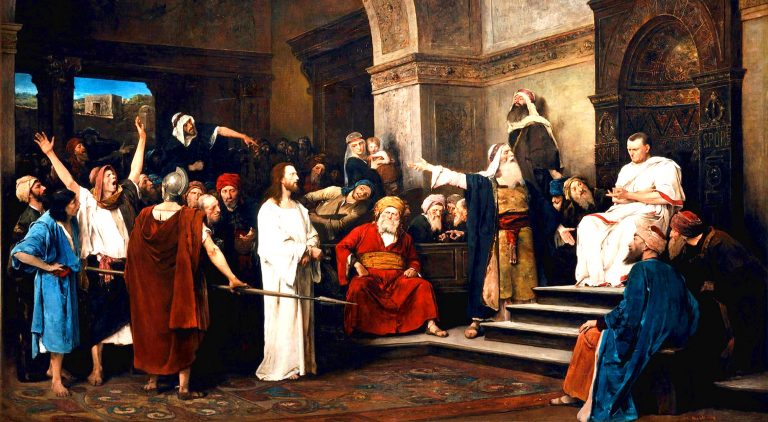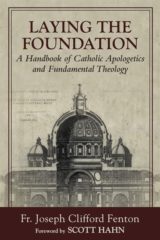By Fr. Joseph Clifford Fenton
Fr. Joseph Clifford Fenton (1906–1969) was professor of fundamental dogmatic theology at the Catholic University of America for twenty-five years and for two decades edited the American Ecclesiastical Review. He authored Laying the Foundation: A Handbook of Catholic Apologetics and Fundamental Theology.

When Origen wrote his introduction to the book Against Celsus, he drew a picture no apologist can afford to forget. He described our Lord standing alone and silent before His accusers in the judgment hall. Shrill voices bore discordant charges against Him, and He would not speak in His own defense. The great Alexandrian made it very clear that the silence of Jesus was freighted with meaning. The important thing there in that courtroom was Jesus Himself. The men who surged about Him knew well what He had said and what He had done. The Saviour wished them to consider only that.
Now Origen knew very well that Jesus of Nazareth never would and never could stand in need of any earthly advocate. His is not a cause to which men are to be won over by skilled pleading or any merely rhetorical tactic. He wills only that men should understand what He has spoken and what He has accomplished. Hence it is that when a man is privileged to stand with Christ, it becomes his duty to conduct himself in a manner that through his speech or writing the men of his age and of his little circle may perhaps gather some more accurate appreciation of the Lord.
It was with this spirit that Origen took up the contest against Celsus. It is in this same spirit that every successful apologist since the dawn of Christianity has faced his task. The men who stand with Christ come and go. The Master remains. Each man who is privileged to plead for Him takes cognizance of the objections and calumnies that the world casts at Him. Then he bends every effort to enable men clearly to see the life and the words of Jesus. All the time he is aware that our Lord seeks for more than some mere refutation of the idle calumnies that are issued against Him, for He stands clothed in that blood which was shed for many.
The efforts of each man or group of men are sharply limited. The effective work of one defender of Christ may reach a few listeners for a short time. Others will come and these in turn will go. But while men live upon this earth there is no more precious and sacred privilege than that of standing forth and speaking for Christ.
At the moment this privilege is ours. The American Catholics of our generation are empowered, as perhaps no similar group in the world is now, to point effectively at Christ. Through our efforts the men of this warring world can come to know Him better, and knowing Him achieve that eternal life He died to procure for them. This at least is certain. If we do not show Christ to men, we shall have failed.
Each man must speak in the language of his people and according to the mentality of his time. Our people are capable of and habituated to a language of scientific accuracy. The time in which we live is by far too difficult to admit of much concern over fanciful systems and theories. We must present the claims of Jesus clearly. It is our business to show the proofs He offered in support of His claims, and to point out how they demonstrate.
In far-off lands theorizers who had no pressing business might sit around in salons and indulge their fancy about some never-never country in which perfectly impartial men set out on a search for the true religion. Now we must take cognizance of facts and act in accordance with them. The Church of God does not wait for men to come to her seeking the divine message. Urged on by the insistent command of her divine Founder, she carries that message to men who suffer and work. With that message she carries credentials, showing it to be a communication from the real and living God, which men ought to accept with the unwavering assent of divine faith and through which alone they can achieve an unending and ineffable happiness. We who are privileged to stand with Christ must be able to show that message and those credentials.
You Might Also Like

Laying the Foundation: A Handbook of Catholic Apologetics and Fundamental Theology is a classic text by the late Fr. Joseph Clifford Fenton, a highly respected author, professor, and theologian of the twentieth century. It's considered by Scott Hahn to be "the high point of apologetics as well as a gold standard for subsequent works of fundamental theology."